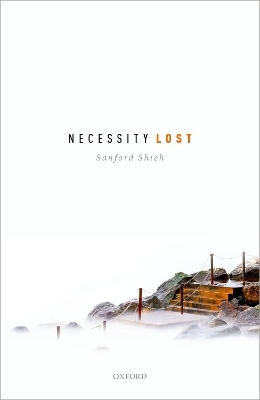
Necessity Lost
Modality and Logic in Early Analytic Philosophy, Volume 1
Seiten
2019
Oxford University Press (Verlag)
978-0-19-922864-5 (ISBN)
Oxford University Press (Verlag)
978-0-19-922864-5 (ISBN)
Philosophers since Aristotle have traditionally held that impossibilities make up the nature of logic. Sanford Shieh investigates an important but underexplored break with this tradition: Frege and Russell questioned whether there really are such things as possibilities or necessities, and sought the foundations of logic elsewhere.
A long tradition, going back to Aristotle, conceives of logic in terms of necessity and possibility: a deductive argument is correct if it is not possible for the conclusion to be false when the premises are true. A relatively unknown feature of the analytic tradition in philosophy is that, at its very inception, this venerable conception of the relation between logic and necessity and possibility - the concepts of modality - was put into question. The founders of analytic philosophy, Gottlob Frege and Bertrand Russell, held that these concepts are empty: there are no genuine distinctions among the necessary, the possible, and the actual. In this book, the first of two volumes, Sanford Shieh investigates the grounds of this position and its consequences for Frege's and Russell's conceptions of logic. The grounds lie in doctrines on truth, thought, and knowledge, as well as on the relation between mind and reality, that are central to the philosophies of Frege and Russell, and are of enduring philosophical interest. The upshot of this opposition to modality is that logic is fundamental, and, to be coherent, modal concepts would have to be reconstructed in logical terms. This rejection of modality in early analytic philosophy remains of contemporary significance, though the coherence of modal concepts is rarely questioned nowadays because it is generally assumed that suspicion of modality derives from logical positivism, which has not survived philosophical scrutiny. The anti-modal arguments of Frege and Russell, however, have nothing to do with positivism and remain a challenge to the contemporary acceptance of modal notions.
A long tradition, going back to Aristotle, conceives of logic in terms of necessity and possibility: a deductive argument is correct if it is not possible for the conclusion to be false when the premises are true. A relatively unknown feature of the analytic tradition in philosophy is that, at its very inception, this venerable conception of the relation between logic and necessity and possibility - the concepts of modality - was put into question. The founders of analytic philosophy, Gottlob Frege and Bertrand Russell, held that these concepts are empty: there are no genuine distinctions among the necessary, the possible, and the actual. In this book, the first of two volumes, Sanford Shieh investigates the grounds of this position and its consequences for Frege's and Russell's conceptions of logic. The grounds lie in doctrines on truth, thought, and knowledge, as well as on the relation between mind and reality, that are central to the philosophies of Frege and Russell, and are of enduring philosophical interest. The upshot of this opposition to modality is that logic is fundamental, and, to be coherent, modal concepts would have to be reconstructed in logical terms. This rejection of modality in early analytic philosophy remains of contemporary significance, though the coherence of modal concepts is rarely questioned nowadays because it is generally assumed that suspicion of modality derives from logical positivism, which has not survived philosophical scrutiny. The anti-modal arguments of Frege and Russell, however, have nothing to do with positivism and remain a challenge to the contemporary acceptance of modal notions.
Sanford Shieh received a BA from Cornell University, an MA from the University of Oxford, and a PhD from Harvard University. He has taught at Wesleyan University since 1993.
Introduction
Part I: Frege
1: The Modalities of Judgment
2: Amodalism
3: From Judgment to Amodalism
4: The Truth in Modalism
5: The Nature of Logic
Part II: Russell and Moore
6: From Idealism to Logicism
7: The Rejection of Modality
8: Completing the Rejection of Idealism
9: Logic and Implication
10: The Continuing Banishment of Modality
| Erscheinungsdatum | 22.05.2019 |
|---|---|
| Verlagsort | Oxford |
| Sprache | englisch |
| Maße | 164 x 236 mm |
| Gewicht | 834 g |
| Themenwelt | Geisteswissenschaften ► Philosophie ► Erkenntnistheorie / Wissenschaftstheorie |
| Geisteswissenschaften ► Philosophie ► Logik | |
| Geisteswissenschaften ► Philosophie ► Philosophie der Neuzeit | |
| ISBN-10 | 0-19-922864-7 / 0199228647 |
| ISBN-13 | 978-0-19-922864-5 / 9780199228645 |
| Zustand | Neuware |
| Informationen gemäß Produktsicherheitsverordnung (GPSR) | |
| Haben Sie eine Frage zum Produkt? |
Mehr entdecken
aus dem Bereich
aus dem Bereich
die Grundlegung der modernen Philosophie
Buch | Softcover (2023)
C.H.Beck (Verlag)
CHF 25,20
Buch | Softcover (2023)
Reclam, Philipp (Verlag)
CHF 9,80

![Was heißt Denken?. Vorlesung Wintersemester 1951/52. [Was bedeutet das alles?] - Martin Heidegger](/media/113619842)
